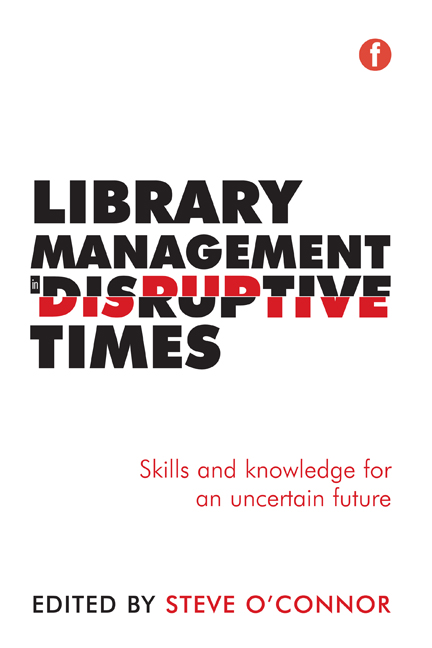Book contents
- Frontmatter
- Contents
- Contributors
- Introduction
- 1 Leading change: knowledge for success
- 2 Management fads and fashions and their impact on the LIS community
- 3 The Five Rules of Engagement for librarians: aux Ranganathan's laws of library science
- 4 Library management, disruption and consortia: an Australian example
- 5 No regrets; just lessons: economic crisis is changing our life and the management of libraries
- 6 Introducing agile principles and management to a library organization
- 7 The role of professional associations in changing times
- 8 And the walls came tumbling down ... The library profession confronts all-invasive new managerialism
- 9 What is behind the meaning of disruption? Or, thinking of management strategies from the outside
- Index
7 - The role of professional associations in changing times
Published online by Cambridge University Press: 08 June 2018
- Frontmatter
- Contents
- Contributors
- Introduction
- 1 Leading change: knowledge for success
- 2 Management fads and fashions and their impact on the LIS community
- 3 The Five Rules of Engagement for librarians: aux Ranganathan's laws of library science
- 4 Library management, disruption and consortia: an Australian example
- 5 No regrets; just lessons: economic crisis is changing our life and the management of libraries
- 6 Introducing agile principles and management to a library organization
- 7 The role of professional associations in changing times
- 8 And the walls came tumbling down ... The library profession confronts all-invasive new managerialism
- 9 What is behind the meaning of disruption? Or, thinking of management strategies from the outside
- Index
Summary
Introduction
This book covers many of the aspects of change that are influencing the nature of the profession of librarianship. One of the key insights that emerges when these aspects are put together in this way is that, although technological developments form the basis of change in the profession in terms of processes and perceptions, it is time to focus on the people aspect if the profession is to be sustained and valued by society.
Like many other professions, librarians have faced new ways of working as organizations and institutions have sought efficiencies and quality improvements through technological solutions. At the same time, they have experienced changes in the way the profession is valued by organizations and, more widely, as technologies enable user-initiated solutions to information needs. The declining perception of the value of librarians in education, business and the community has been the basis of decisions to close libraries and deprofessionalize workforces, despite studies that have attempted to prove value in these areas.
Professional associations have a primary responsibility to represent the profession they were established to support. The national associations often have a responsibility to work with educators, employers, legislators, funding bodies and other professional bodies that have influence on the profession. National associations vary in how they see their respons - ibilities to the profession. Some focus on the people within the profession, while others focus on the libraries and other employing institutions. Some focus on both of these areas equally. Some embrace emerging fields and non-traditional roles more readily than others. Many invite different groups such as educators and paraprofessionals to take up association membership. These variations have altered the membership characteristics and structures of many national associations, and on an international level have contributed to inconsistency in what can be expected from a national library association.
The changes that the profession has undergone since the mid-1980s have consequences for all library associations, and in particular for national library associations. The core roles and responsibilities that we place on the national associations have not changed, and so we can expect them to be concerned about education, research, advocacy, training and development, communication, regulation, standards and legislation.
- Type
- Chapter
- Information
- Library Management in Disruptive TimesSkills and knowledge for an uncertain future, pp. 101 - 118Publisher: FacetPrint publication year: 2015



